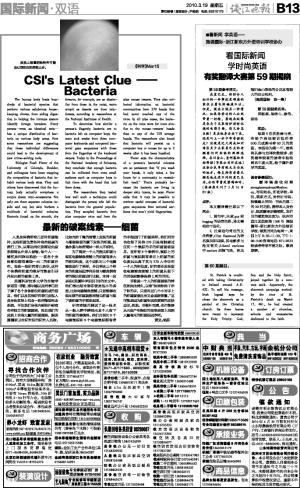CSI's Latest Clue ——Bacteria
The human body hosts hundreds of bacterial species that perform various salubrious housekeeping chores, from aiding digestion to helping the immune system identify foreign invaders. Every person—even an identical twin—has a unique distribution of bacteria on various body areas. Now some researchers are suggesting that these individual differences could lead to the development of new crime-solving tools.
Biologist Noah Fierer of the University of Colorado, Boulder, and colleagues have been mapping the composition of bacteria that inhabit various body sites. They and others have discovered that the human body actually comprises a couple dozen mini-ecosystems. Not only are there separate colonies inside and out, but skin harbors a multitude of bacterial colonies. Bacteria found on the smooth, dry forearm, for example, are as dissimilar from those in the moist, warm armpit as deserts are from rainforests, according to researchers at the National Institutes of Health.
To determine how similar a person's fingertip bacteria are to bacteria left on computer keys, the team took swabs from three computer keyboards and compared bacterial gene sequences with those from the fingertips of the keyboard owners. Today in the Proceedings of the National Academy of Sciences, they conclude that enough bacteria can be collected from even small surfaces such as computer keys to link them with the hand that laid them down.
The researchers then tested how well such a technique could distinguish the person who left the bacteria from the general population. They sampled bacteria from nine computer mice and from the nine mouse owners. They also collected information on bacterial communities from 270 hands that had never touched any of the mice. In all nine cases, the bacteria on the mice were far more similar to the mouse-owners' hands than to any of the 270 strange hands. The researchers also found that bacteria will persist on a computer key or mouse for up to 2 weeks after it has been handled.
Fierer says the characteristics of a person's bacterial colonies are so persistent that "if you wash your hands, it only takes a few hours for a community to reestablish itself." That's probably because the bacteria are living in deeper skin layers, he says. Fierer adds that it may be possible to retrieve useful amounts of bacterial gene sequences from textured surfaces that won't yield fingerprints.
